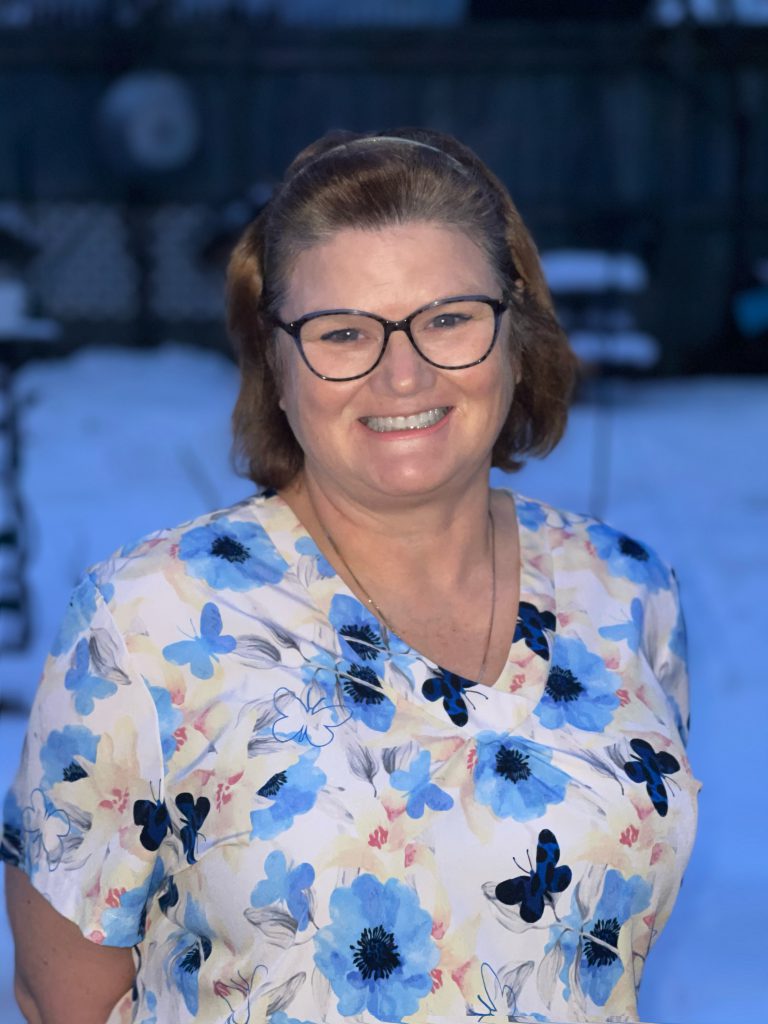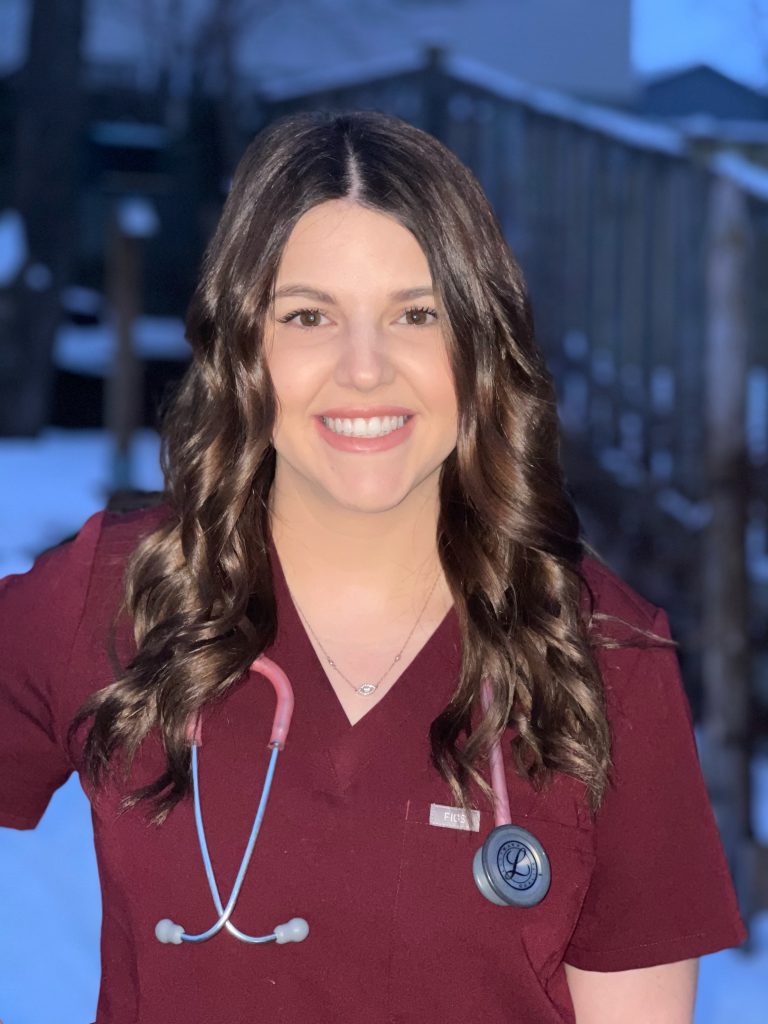Daughter begins nursing career as mother fights for her life in ICU
May 7, 2021
May 10 to 16 is National Nursing Week in Canada. To honour some of our frontline heroes, Georgian will be sharing stories of hardworking, courageous nurses all week long.
“It makes me kind of emotional thinking about it because Mother’s Day was the last time I saw my mom before she went into the hospital,” says Sarah Waltman. “This has definitely made us closer. I wake up every day thankful to have her here with me. She truly inspires me every single day with her work ethic and positive attitude. I don’t know what I would do without her. She is such a shining light. Truly a superhero in her work and at home.”
– Sarah Waltman, Registered Nurse at Orillia Soldier’s Memorial Hospital
Nursing alumna turned COVID-19 patient
Shelley Biscoe, alumna, class of 1994
In the spring of 2020, Shelley Biscoe was the extremely busy quality experience leader for the medical and rehabilitation floors at Orillia Soldiers’ Memorial Hospital (OSMH). As lead on policy, patient safety and training, a large part of her work suddenly pivoted to preparing her colleagues for the new and frightening COVID-19 virus.
A few weeks later, Shelley herself became the hospital’s first COVID-19 patient. She credits her colleagues – nurses, doctors, respiratory therapists, pharmacists and others – with saving her life.
“At first, I never really felt ill, but my brain was affected immediately,” she recalls. “I was in a Zoom meeting, and suddenly it felt as if everyone was talking like Charlie Brown’s teacher. It was all mumbled and I couldn’t understand a word.”

By that night she had a fever. Then a COVID-19 test confirmed her fears. She had contracted the virus, despite her best efforts to take precautions.
After Georgian College, Shelley’s career in nursing took her to the United States, including a stint at the renowned Walter Reed National Military Medical Centre in Washington D.C. She returned to her hometown of Orillia, Ontario in 2003 and until recently, spent most of her career in the OSMH Intensive Care Unit (ICU).
Now, she was the patient. That first week at home, as she monitored her own vital signs, her fever plateaued at a dangerous 104 degrees Fahrenheit. Shelley says she knew it was serious.
“In those few days, despite the fever, I got my finances in order, did all my banking, and even had a new will drawn up.”
Then she went to the hospital. “When my spouse left me at the doors to the emergency department, we really thought that might be the last goodbye,” she admits.
In the ER, suddenly all the new COVID-19 protocols she helped to write were put into effect. “How do you transport someone clear across the hospital to ICU without endangering others? I’d been leading the practices for that, now it was happening to me. Evidently, I was still telling everyone what to do. I don’t remember that part,” she says wryly.

Within a day, Shelley was hooked up to a ventilator. She would stay on it for three weeks. Her ICU nurses were friends and colleagues. Many were fellow Georgian grads, some she had mentored as students or when they first started their careers.
“At one point I woke up and a nurse was working on the range of motion on my feet and I didn’t understand it was me that was vented. I remember thinking, I’ve got to tell her how pleased I am at her care for that patient,” she recalls.
In all, Shelley spent more than a month in hospital and many more months recovering. She’s now part of a worldwide study of long-haulers, COVID-19 patients who have lasting, often life-changing symptoms.
When she left the hospital she couldn’t walk, but the physical symptoms eventually improved. “For me, the number one issue was confusion and brain fog,” she says. “In rehabilitation I was treated as if I had a brain injury. That’s how it felt for six months. I used to be the person saying, ‘come on guys, it’s not that hard,’ and now I was the one asking the extra questions. I’ve had to eat some humble pie.”
Today, Shelley is back at work full time. “I’d say I’m back to 100 per cent, with coping strategies,” she says. “I need to organize myself now. I’m a lot more methodical and write everything down.”
Forever grateful for the care she received, Shelley is humbled by the response of her colleagues. “I know it was hard for those who looked after me,” she says. “And so many others across the hospital, even people I don’t know, have told me how worried they were for me. You know, you walk around feeling you don’t make much of a difference, but I soon learned there were so many people thinking of me and praying for me. There’s awesomeness in that.”
Daughter begins nursing career a few floors away
Sarah Waltman, alumna, class of 2020
There is one other poignant chapter in Shelley Biscoe’s COVID-19 story.
While she fought for her life in the ICU at Orillia Soldiers’ Memorial Hospital (OSMH), her daughter Sarah Waltman, worked her first day as a Registered Nurse a few floors away.
After graduating from Georgian’s Honours Bachelor of Science in Nursing collaborative degree program, Sarah began her career as an RN in OSMH’s integrated medicine and rehab services.
“I became a nurse because of my mom,” she says. “I was so inspired by her. Normally I talk to her every day, often several times, and on my first day at work all I wanted was to call and tell her about it.”

Amid worry for Shelley and the uncertain early days of the pandemic, Sarah admits, “It was scary. On my first few days, we were learning the protocols for codes and I couldn’t help thinking, at any time that could be for my mom. But I heard her voice in the back of my head, ‘just get it done, focus on what you have to do.’ I also knew most of the ICU staff and believed she was getting the best care possible, so that was comforting.”
Now that Shelley is back at work, Sarah is thriving in her dream career. Her long-term goal is to work in the Neo-natal Intensive Care Unit, and she recently began her Master’s in Nursing Education at Walden University (online).
But her overall goal is to have an impact. “I get to be part of the team helping a patient on the rehabilitation floor work hard for weeks to finally walk and go home,” she says. “Being able to actually make a difference, that’s why I want to do this.”
This article was originally published in the spring 2021 edition of GeorgianView, the college’s alumni magazine.